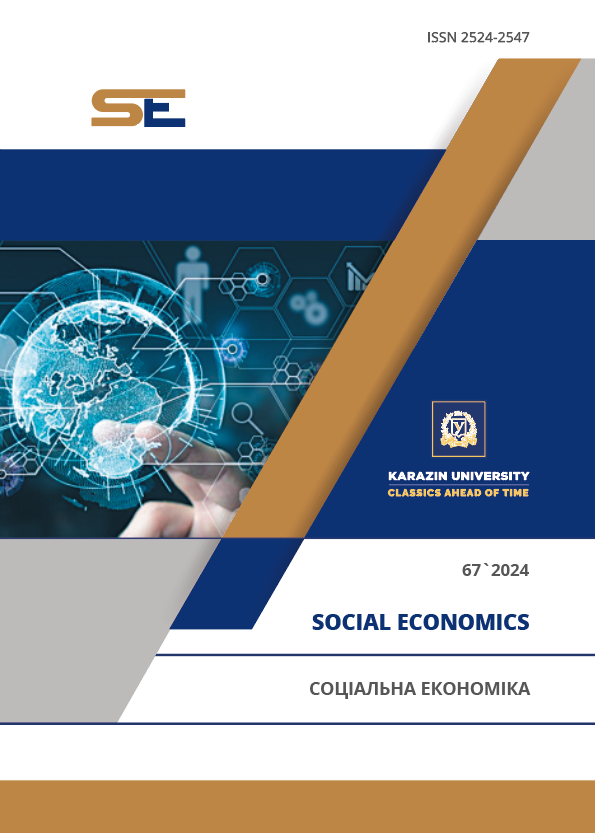INNOVATIVE STRATEGIES FOR ENTERPRISES’ DEVELOPMENT IN THE CONDITIONS OF MODERN CHALLENGES
Abstract
The article deals with the peculiarities of formation and implementation of the enterprise development innovation strategy. The research substantiates the demand for adapting innovation processes to modern challenges, including the use of digital platforms and the transition to a corporate or open innovation model. The fundamental principles of an effective enterprise development strategy based on a new management paradigm are highlighted. A new understanding regarding the essence of the category “innovation strategy” is proposed. The conditions for successful implementation of the enterprise innovation strategy are determined: defining the mission, goals and objectives of the enterprise innovation activity; breaking the process into stages and determining the expected results; applying flexible models of the innovation process; developing indicators for objective evaluation of the innovation activity results; improving the innovation culture; identifying and developing creative talents; introducing and implementing innovative initiatives; maintaining customer feedback; inter-organizational cooperation. An algorithm for building inter-organizational cooperation in the innovation activities of enterprises is designed. The experience of developing and applying innovative strategies is highlighted on the example of well-known innovative companies. It is proved that the success of their implementation depends on the concentration of financial, material, informational and intellectual resources in the context of innovation development priorities. It is emphasized that in the process of forming an innovative strategy for the development of enterprises, it is necessary to take into account a number of factors, such as the enterprise’s market position, its technical and technological potential, management system, ethics and business culture, as well as research capabilities. A properly chosen and justified innovation strategy has shown itself to be the key to the successful development of an enterprise in the future. The authors’ research findings and practical recommendations contribute to the effective use of the enterprise’s innovation strategy for the sustainable development of business organizations and their network associations.
Downloads
References
Sloan, A. (2020). My Years with General Motors. Nash format. (in Ukrainian)
Pylypenko, H., Pylypenko, Yu., Prokhorova, V., Mnykh, O., & Dubiei, Yu. (2021). Transition to a new paradigm of human capital development in the dynamic environment of the knowledge economy. Naukovyi Visnyk Natsionalnoho Hirnychoho Universytetu, 6, 142-148. doi: https://doi.org/10.33271/nvngu/2021-6/170
Ostrovska, H. Yo., Sherstiuk, R. P., Tsikh, H. V., Demianyshyn, V. H., & Danyliuk-Chernykh, I. M. (2021). Conceptual Principles of Learning Organization Building. Naukovyi Visnyk Natsionalnoho Hirnychoho Universytetu, 3, 167-172. doi: https://doi.org/10.33271/nvngu/2021-3/167
Khymych, I. (2023). Features of innovative activities in ukraine in the conditions of war. Galician economic journal, 84 (5), 142-150. doi: https://doi.org/10.33108/galicianvisnyk_tntu2023.05.142 (in Ukrainian)
Shkurenko, O., & Chorna, T. (2023). Innovative Strategy for the Development of the Enterprise in the Conditions of Adaptation to Modern Challenges. Adaptyvne upravlinnia: teoriia i praktyka, 16 (32), 1-14. doi: https://doi.org/10.33296/2707-0654-16(32)-10 (in Ukrainian)
Dykha, M., & Dykha, V. (2023). The level of innovation of Ukraine’s development in the global dimension and outlining its prospects. Economic Scientific Journal, 2, 5-15. doi: https://doi.org/10.32782/2786-765X/2023-2-1 (in Ukrainian)
Orlova, N., Vynnyk, T., & Pobihun, S. (2023). Innovative strategies for business development in crisis: analysis and practical implementation in Ukraine. Economy and society, 56. doi: https://doi.org/10.32782/2524-0072/2023-56-75
Bozhkova, V., & Halytsia, I. (2022). Mechanisms to ensure the development of the economy of the future in the context of global change. Futurity Economics & Law, 2(2), 4‐13. doi: https://doi.org/10.57125/FEL.2022.06.25.01
Kuzior, A., et al. (2022). The Mechanism of Forming the Strategic Potential of an Enterprise in a Circular Economy. Sustainability, 14(6). doi: https://doi.org/10.3390/su14063258/
Foss, N. J., & Saebi, T. (2017). Fifteen years of research on business model innovation: how far have we come, and where should we go? Journal of Management, 43(1). doi: https://doi.org/10.1177/0149206316675927
Korytko, T., et al. (2021). Strategy of Innovative Development of an Enterprise on the Basis of Evaluation of Its Intellectual Capital. Naukovyi visnyk Natsionalnoho hirnychoho universytetu, 3, 134-141. doi: https://doi.org/10.33271/nvngu/2021-3/134
Latysheva, O., Rovenska, V., Smyrnova, I., Nitsenko, V., Balezentis, T., & Streimikiene, D. (2020). Management of the sustainable development of machine-building enterprises: a sustainable development space approach. Journal of Enterprise Information Management, 34(1), 328-342. doi: https://doi.org/10.1108/JEIM-12-2019-0419.
Yepifanova, I. (2020). Formation of innovative strategies of industrial enterprises in modern conditions. Entrepreneurship and innovation, 13, 33-39. doi: https://doi.org/10.37320/2415-3583/13.6 (in Ukrainian)
Cherep, О., Cherep, A., Ohrenych, Y., Helman, V., & Gorbunova, A. (2024). Mprovement of the management mechanism of the strategy of innovative activities of enterprises. Financial and credit activity: problems of theory and practice, 1(54), 471-484. doi: https://doi.org/10.55643/fcaptp.1.54.2024.4295
Zaitseva, A. (2024). Blitz-scaling in the Strategic Configuration of Enterprise Development Transparency Management Based on Digital Coherence. Biznesinform, 1, 249-257. doi: https://doi.org/10.32983/2222-4459-2024-1-249-257 (in Ukrainian)
Sipa, М. (2021). Diversification of Capabilities of Economies in the Field of Talent Management. Poland Against the Background of the European Union. European Journal of Sustainable Development, 8 (2), 268-278. Retrieved from https://ecsdev.org/ojs/index.php/ejsd/article/view/811
Ostrovska, H. Y., Strutynska, I. V., Sherstiuk, R. Р., Pietukhova, О. M., & Yasinetska I. А. (2023). Development of collective intelligence in the enterprises’ digital transformation. Naukovyi Visnyk Natsionalnoho Hirnychoho Universytetu, 3, 157-163. doi: https://doi.org/10.33271/nvngu/2023-3/157
Ostrovska, H., Sherstiuk, R., Maliuta, L., & Palianytsia, V. (2023). Imperatives of enterprise intellectual leadership in a knowledge-based economy. Economic Herald of the Donbas, 2(72), 62-72. doi: https://doi.org/10.12958/1817-3772-2023-2(72)-62-72 (in Ukrainian)
Polyakov, M., Khanin, I., Shevchenko, G., & Bilozubenko, V. (2023). Knowledge management in international companies: specific features and information tools. Financial and Credit Activity Problems of Theory and Practice, 3(50), 457-467. doi: https://doi.org/10.55643/fcaptp.3.50.2023.4061
Liudvik, I. (2023). Innovative development of Ukraine in the context of globalization of the economic space. State and regions, 2(125), 36-40. DOI: https://doi.org/10.32840/1814-1161/2022-2-6
Drucker, P. (2020). Management Challenges for the 21st Century. KM-BOOKS. (in Ukrainian)




